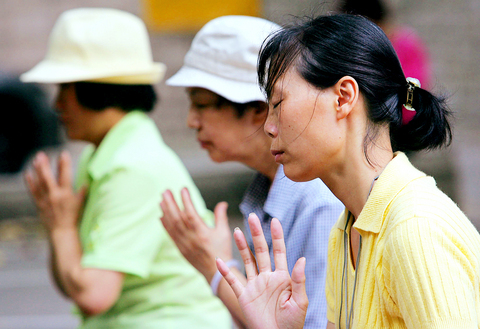Hong Kong's top court yesterday overturned criminal convictions against eight followers of the Falun Gong spiritual group accused of assaulting and obstructing police in a 2002 protest, in a case seen as a key test of judicial independence under Chinese rule.
"The freedom to demonstrate peacefully is a constitutional right," a summary of the court ruling said.
The decision may bolster confidence in Hong Kong's legal system, which has faced criticism in recent weeks that judicial independence is being eroded by meddling from Beijing.

AP PHOTO: AP
"This decision gives more adequate protection to Hong Kong people, including Falun Gong followers, who protest and air their grievances peacefully," said Falun Gong spokesman Kan Hung-cheung (
The case stemmed from a March 2002 protest against China's ban on Falun Gong, which Beijing considers to be an evil cult that threatens society. The spiritual movement wasn't banned in Hong Kong, but authorities arrested the demonstrators outside China's liaison office in Hong Kong. They were convicted of assaulting and obstructing police -- the first such convictions against Falun Gong in the territory, sparking fears that Beijing's crackdown on the group was expanding to Hong Kong.
The public was riveted by the case initially, but interest dropped off as the legal battle dragged on into appeals.
The Court of Final Appeal yesterday overturned the convictions, saying the demonstration was legitimate and the arrests were illegal. The court ruled that the defendants couldn't be held accountable for their behavior during their illegal detention.
The court said in its summary that freedom of expression is "at the heart of Hong Kong's system and the courts should give them a generous interpretation."
The ruling came amid complaints from pro-democracy lawmakers and legal experts that Hong Kong's law has been compromised by Beijing's interference during the past month.
Last week, China's most powerful legislative body resolved a constitutional dispute over how long Hong Kong's next leader should serve. Pro-democracy lawmakers and legal experts thought Hong Kong's courts should have resolved the issue.
Yesterday's ruling didn't ease the worries of Law Yuk-kai (
Hong Kong courts could be "completely sidelined," Law said.
Beijing has issued legal decisions on Hong Kong twice before. The rulings blocked quick democratic reforms and limited the ability of Chinese to obtain residency rights in Hong Kong. Both stirred outrage.

Shamans in Peru on Monday gathered for an annual New Year’s ritual where they made predictions for the year to come, including illness for US President Donald Trump and the downfall of Venezuelan President Nicolas Maduro. “The United States should prepare itself because Donald Trump will fall seriously ill,” Juan de Dios Garcia proclaimed as he gathered with other shamans on a beach in southern Lima, dressed in traditional Andean ponchos and headdresses, and sprinkling flowers on the sand. The shamans carried large posters of world leaders, over which they crossed swords and burned incense, some of which they stomped on. In this

The death of a former head of China’s one-child policy has been met not by tributes, but by castigation of the abandoned policy on social media this week. State media praised Peng Peiyun (彭珮雲), former head of China’s National Family Planning Commission from 1988 to 1998, as “an outstanding leader” in her work related to women and children. The reaction on Chinese social media to Peng’s death in Beijing on Sunday, just shy of her 96th birthday, was less positive. “Those children who were lost, naked, are waiting for you over there” in the afterlife, one person posted on China’s Sina Weibo platform. China’s

‘NO COUNTRY BUMPKIN’: The judge rejected arguments that former prime minister Najib Razak was an unwitting victim, saying Najib took steps to protect his position Imprisoned former Malaysian prime minister Najib Razak was yesterday convicted, following a corruption trial tied to multibillion-dollar looting of the 1Malaysia Development Berhad (1MDB) state investment fund. The nation’s high court found Najib, 72, guilty on four counts of abuse of power and 21 charges of money laundering related to more than US$700 million channeled into his personal bank accounts from the 1MDB fund. Najib denied any wrongdoing, and maintained the funds were a political donation from Saudi Arabia and that he had been misled by rogue financiers led by businessman Low Taek Jho. Low, thought to be the scandal’s mastermind, remains

Australian Prime Minister Anthony Albanese yesterday announced plans for a national bravery award to recognize civilians and first responders who confronted “the worst of evil” during an anti-Semitic terror attack that left 15 dead and has cast a heavy shadow over the nation’s holiday season. Albanese said he plans to establish a special honors system for those who placed themselves in harm’s way to help during the attack on a beachside Hanukkah celebration, like Ahmed al-Ahmed, a Syrian-Australian Muslim who disarmed one of the assailants before being wounded himself. Sajid Akram, who was killed by police during the Dec. 14 attack, and